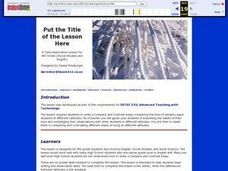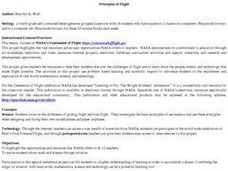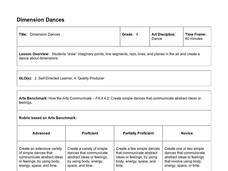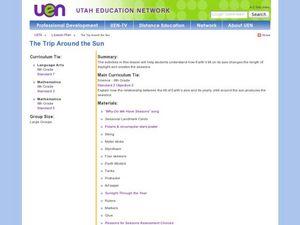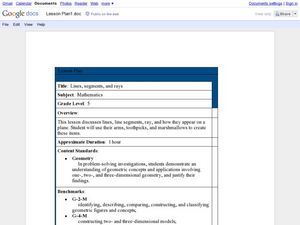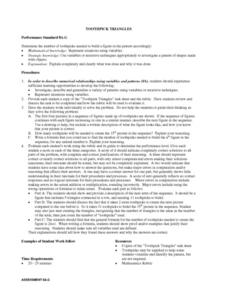Curated OER
Levers and Wedges in the Human Body
Young biologists identify parts of the body that serve as wedges (teeth and fingernails), and as levers (jaw, arms, and legs). The hands-on activities described here should be exciting for learners to perform, and should also lead to a...
Curated OER
Mathematics Module
Delve into graphing! The concepts covered begin with basic graphing basic coordinates and algebraic expressions on coordinate planes, and build up to graphing linear inequalities and equations. Learners solve and simplify various...
Curated OER
Making and Using a Gel Person to Teach Human Anatomy
Students investigate organs, anatomical planes and transverse sections of the human body using gel people. In this human anatomy lesson plan, students use gel molds, gel and food items to make models of the human body. They create a...
Curated OER
Bowling - Lesson 2
Lesson 2, which is about bowling footwork, is part of a unit on bowling. There is a link at the bottom of this page that will go to the unit page. The unit plan is pretty comprehensive and the lessons should be taught in order. The unit...
Curated OER
Boat Safety and Water Sports - Lesson 20 - Dry Land Wake Board Work
Lesson 20 is part of a 22 lesson unit on boat safety and water sports. The focus in this lesson is getting up on the wake board. If you click on the resource link at the bottom of the page, there is another resource link that goes to the...
Purdue University
The Represented World: Recreational STEM
How are forces and motion important to a swing set? Scholars explore the concepts of force and motion using swing sets. In preparation for their own STEM design project, individuals take surveys and data from peers, complete labs on...
Cornell University
Buoyancy
Swimmers know to float by turning their bodies horizontally rather than vertically, but why does that make a difference? In an interesting lesson, scholars explore buoyancy and the properties of air and water. They test cups to see which...
Curated OER
Learning the Dissecting Planes
Students explore dissecting planes. In this biology lesson plan, students learn the basic vocabulary used in dissection, learn how to orient themselves on a three dimensional figure, and develop the manual dexterity necessary to use...
National Security Agency
What’s Your Coordinate?
Your middle schoolers will show what they know with their bodies when they become the coordinate plane in this conceptual development unit. Starting with the characteristics of the coordinate plane, learners develop their skills by...
Curated OER
Why Do We Have Seasons?
First graders watch a video about the seasons. They role play with the teacher the sun and earth. The student's heads are the earth, their foreheads are the Northern Hemisphere. The teacher shines a flashlight on them to simulate the sun...
Curated OER
Edinburgh Festival Lessons That Teach About Culture And Art
The Edinburgh Festival provides a way for students to explore lesson plans about opera, theater, and music.
Curated OER
Put the Title of the Lesson Here
Eighth graders write a Compare and Contrast essay comparing the lives of similarly aged students at different Latitudes. They share their essays with epals, via e-mail. They may include digital photographs in their correspondence as well.
Curated OER
Simple Machines
Students investigate simple machines. In this simple machines instructional activity, students explore how tools increase productivity and make life easier. Students experiment with simple tools and discover the parts of each tool.
Curated OER
Dayna Lykins, Leanna Prater
Fourth graders compare and contrast gliding flight and true flight. They investigate the basic principles of aeronautics. The class participates in activities to observe lift and the effect of air. Students design and fly their own...
Hawaiʻi State Department of Education
Dimension Dances
Use dance to help learners conceptualize line segments, rays, lines, and planes. They choreograph dances that show dimensional space. Dancers start by pondering space, point, and lines as the teacher draws them in the air. Each movement...
Hawaiʻi State Department of Education
Machines
What do science and dance have in common? Simple machines, work, and force! First, children discuss machines, wheels, inclined planes, and wedges. They create inclined planes with their bodies and make up dances about wheels and wedges....
Savvas Learning
Putting Shapes in Order
Challenge math scholars with polygon word problems that require logical reasoning. They answer two word problems about geometric shapes and their arrangement in a column based on clues given. Next, learners draw a robot made of shapes...
Curated OER
The Trip Around the Sun
Sixth graders investigate the relationship between the tilt of the Earth's axis and the seasons. For this earth science lesson, 6th graders sing the song "Why Do We Have Seasons" and use simulate the Earth's tilt by using their bodies.
Curated OER
Lines, Segments, and Rays
Fifth graders use their arm, toothpicks, and marshmallows to create lines, segments, and rays. In this lines, segments, and rays lesson plan, 5th graders learn how these appear on a plane.
Curated OER
Almost Famous: Three People Who Aren't in the History Books
Enrich your history lessons with books about three little known figures: Thomas Banning, Annie Taylor, and Tony Sarg.
California Academy of Science
Kinesthetic Astronomy: Mars Opposition Dance
Your class will watch as one child orbits the sun as Earth, while another orbits as Mars. If the timing is right, they will see the repetitive dance between the two planets and discover how often they are opposite from each other. For...
Hawaiʻi State Department of Education
Symmetrical Objects
In order to better understand how to locate a plane of symmetry in 3-dimensional objects, learners create a dance. The class reviews dance and math symmetry, then they practice making symmetrical shapes and movements with a partner. They...
Curated OER
Toothpick Triangles
Students draw a chart (included in the instructional activity) to use with their investigation. They review terminology of triangles and receive toothpicks to use in the instructional activity. Beginning with three toothpicks, students...
Curated OER
Let's Think About... Magnets and Gravity
Students watch an episode of the PBS show "Jay Jay the Jet Plane," and explore magnets and gravity. They conduct various experiments involving magnets and sand, bean bags, and a fishing pole with magnets.













